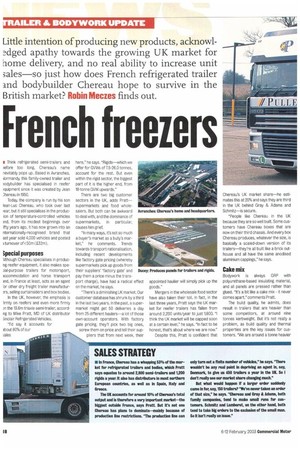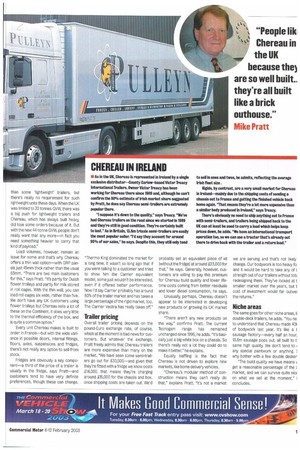French freezers--
Page 18

Page 19

If you've noticed an error in this article please click here to report it so we can fix it.
I Think refrigerated semi-trailers and &ore too long, Chereau's name nevitably pops up. Based in Avranches, Jormandy, this family-owned trailer and )odybuilder has specialised in reefer )quipment since it was created by Jean Thereau in 1950.
Today, the company is run by his son lean-Luc Chereau, who took over last rear, but it still specialises in the producion of temperature-controlled vehicles incl, from its modest beginnings over iffy years ago, it has now grown into an nternationally-recognised brand that ast year sold 4,000 vehicles and posted turnover of €50m (1.32m).
;pedal purposes
\ !though Chereau specialises in producng reefer equipment, it also makes spe)ial-purpose trailers for motorsport, Iccommodation and horse transport Ind, in France at least, acts as an agent 'or other dry freight trailer manufactur;rs, selling curtainsiders and box bodies.
In the UK, however, the emphasis is irmly on reefers and even more firmly )n the 13.6m triaxie semi-trailer, accordng to Mike Pratt, MD of UK distributor Iiinoiair Refrigerated Vehicles.
"I'd say it accounts for ibout 80% of our ;ales here," he says. "Rigids—which we offer for GVWs of T5-26.0 tonnes, account for the rest. But even within the rigid sector, the biggest part of it is the higher end, from 18-tonne GVW upwards."
There are two big customer sectors in the UK, adds Pratt— supermarkets and food wholesalers. But both can be awkward to deal with, and the dominance of supermarkets, in particular, causes him grief.
'In many ways, it's not so much a buyer's market as a bully's market," he comments. Trends towards transport rationalisation, including recent developments like factory gate pricing (whereby supermarkets pick up goods from their suppliers' 'factory gate' and pay them a price minus the transport charge), have had a radical effect on the market, he says.
"There's a diminishing UK market. Our customer database has shrunk by a third in the last two years. In the past, a supermarket might get 50 deliveries a day from 25 different haulers—a lot of those own-account operators. With factory gate pricing, they'll pick two big ones, screw therm on price and tell their sup pliers that from next week, their appointed haulier will simply pick up the goods," Mergers in the wholesale food sector have also taken their toll. In fact, in the last three years, Pratt says the UK market for reefer trailers has fallen from around 2,200 untts/year to just 1,600. "I think the UK market will be capped soon at a certain level," he says. 'in fact to be honest, that's about where we are now."
Despite this, Pratt is confident that Chereau's UK market share—he estimates this at 20% and says they are third in the UK behind Gray & Adams and Schmitz—is secure.
"People like Chereau in the UK because they are so well built. Some customers have Chereau boxes that are now on their third chassis. And every box Chereau produces, whatever the size, is basically a scaled-down version of its trailers—they're all built like a brick outhouse and all have the same anodised aluminium cappings," he says.
Cake mix
Bodywork is always GAP with polyurethane-based insulating material, and all panels are pressed rather than glued. It's a bit like a cake mix it never comes apart," comments Pratt.
The build quality, he admits, does result in trailers that are heavier than some competitors, at around nine tonnes kerbweight. But it's not really a problem, as build quality and thermal properties are the key issues for customers, We are around a tonne heavier than some 'lightweight' trailers, but there's really no requirement for such lightweight units these days. When the UK was limited to 32 tonnes GVW, there was a big push for lightweight trailers and Chereau, which has always built heavy, did lose some orders because of it. But with the new 44-tonne GVW, people don't really want that any more—in fact you need something heavier to carry that kind of payload."
Load volumes, however, remain an issue for some and that's why Chereau offers a thin wall option—with GRP panels just 45mm thick rather than the usual 63mm. "There are two main customers for this," says Pratt, it's partly for Dutch flower trolleys and partly for milk stored in roll cages. With the thin wall, you can load roll cages six wide, rather than five. We don't have any UK customers using flower trolleys but Chereau sells a lot of these on the Continent. It does very little to the thermal efficiency of the box, and is quite a common option."
Every unit Chereau makes is built to order in France—but with the wide variance in possible doors, internal fittings, floors, axles, suspensions and fridges, there's not really any option to sell from stock.
Fridges are obviously a key component—a third of the price of a trailer is usually in the fridge, says Pratt—and customers tend to have very definite preferences, though these can change.
"Thermo King dominated the market for a long time. It wasn't so long ago that if you were talking to a customer and tried to show him the Carrier equivalent model, some just wouldn't be interested, even if it offered better performance. Now I'd say Carrier probably has around BO% of the trailer market and has taken a large percentage of the rigid market, too. The Carrier Vectra has really taken off."
Trailer pricing
Overall trailer pricing depends on the pound-Euro exchange rate, of course, which at the moment is bad news for customers. But whatever the exchange, Pratt freely admits that Chereau trailers are more expensive than many on the market. "We have seen some semi-trailers go out for 130,000—and given that they're fitted with a fridge we know costs 114,000, that means they're charging around 115,000 for the chassis and box, once shipping costs are taken out. We'd probably sell an equivalent piece of kit [without the fridge] at around 123,000 for that," he says. Generally, however, customers are willing to pay this premium for Chereau build quality and lower lifetime costs coming from better residuals and lower diesel consumption, he says.
Unusually, perhaps, Chereau doesn't appear to be interested in developing new products or growing its UK market share.
"There aren't any new products on the way," confirms Pratt. The current Tecnogam range has remained unchanged since 1996, he adds. "It's basically just a big white box on a chassis. So there's really not a lot they could do to make it better," he explains.
Equally baffling is the fact that Chereau is not driven to explore new markets, like home delivery vehicles.
"Chereau's modular method of construction means they can't really do that," explains Pratt. "It's not a market
we are serving and that's not likely change. Our bodywork is too heavy fo and it would be hard to take any of t strength out of our trailers without tot redesigning them. They've looked at t smaller market over the years, but t cost of investment would far outwei the returns."
Niche areas
The same goes for other niche areas, Ii double-deck trailers, he adds. "You no to understand that Chereau made 404 of bodywork last year. It's like a t sausage factory—every half an hour, 13.6m sausage pops out, all built to t same high quality We don't tend to any special paintwork or anything. why bother with a few double decker "The build quality we have means ■ get a reasonable percentage of the market, and we can survive quite nici on what we sell at the moment," I concludes.




























































































































































